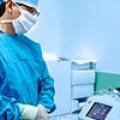I am a medical healthcare writer with experience of 10+ years with Ph.D. pharma and medical industry... View More
About Me
Entertainment
2
Likes
Entertainment
Kritika Mishra
posted a blog.
In India, cardiovascular surgeries have been growing for the past decade. More than 60,000 open-heart surgeries are performed yearly in the country. While India is developing infrastructure and affordability, it facilitates better access to experienced cardiologists and hospitals across the nation.
Some of the top-rated Cardiac Surgeries Hospitals in India are: -
Medanta, The Medicity
Located in Gurugram, Haryana, the Heart Institute at Medanta is one of the top integrated healthcare centers across the country. It embraces a highly experienced, skilled, and dedicated team of heart surgeons, cardiologists, and radiologists who provide comprehensive and multidisciplinary care to patients undergoing various heart ailments. The hospital is sub-specialized with the latest technologies in Clinical and Preventive Cardiology, Cardiac Surgery, Interventional Cardiology, and Electrophysiology and Pacing.
Jaypee Hospital
Jaypee Hospital, situated in Noida (Uttar Pradesh), provides the most advanced heart treatments. It offers services including Non-Interventional Cardiology, Interventional Cardiology, Cardiology, Paediatric Cardiology, Electrophysiology and Devices, Adult Cardiac Surgery, Paediatric Cardiac Surgery, Vascular Surgery, and Heart Transplant. The hospital is equipped with a single plane and biplane interventional Cath labs with one of its kind clarity platforms, the first-ever in the country.
Fortis Escorts Heart Institute
Fortis Escorts Heart Institute, New Delhi, has established its department of Cardiac Sciences as a pioneer in the field of cardiac care. It is recognized as one of the well-known centers in the country. Equipped with clinical expertise and cutting-edge technology, the department has enhanced numerous lives through its world-class treatment and infrastructure.
Apollo Hospitals
Spread across India, Apollo Hospitals has gained global recognition in providing treatments and procedures in cardiology and cardiothoracic surgery. The hospital has performed over 1,52,000 cardiac and cardiothoracic surgeries and has achieved a 99.6% success rate. Moreover, the centers have dedicated Cardiothoracic CCUs with one nurse per bed each shift throughout the day.
Artemis Hospital
The Artemis Heart Centre is amongst the first to be accredited with JCI and NABH certifications in the country. With cutting-edge technology and infrastructure, the center includes Clinical Cardiology, Preventive Cardiology, and Paediatric Cardiology. Artemis Heart Centre has performed more than 30,000 successful procedures over the last six years.
Max Healthcare Hospitals
Max Institute of Cancer Care provides a holistic and integrated treatment by specialists in Surgical Oncology, Radiation Oncology, and Medical Oncology. It is also the first facility in northern India to obtain Novalis Tx for IMRT/IGRT, Radiosurgery, HIPEC, and SRS/SRT. Equipped with an advanced Da Vinci XI Robotic System, Stereotactic Body Radiation Therapy (SBRT), and HIPEC, the center has performed complex heart surgeries.
Sakra World Hospital
Based in Bengaluru (Bangalore), The Sakra Institute of Cardiac Sciences specializes in advanced diagnosis and treatment procedures for cardiac diseases and disorders. The hospital delivers comprehensive care to patients suffering from heart conditions with a dedicated panel of highly experienced Cardiac Surgeons and Cardiologists. Equipped with a hybrid operating suite, the first of its kind in this region, the center performs minimally invasive cardiac operations, percutaneous valve surgeries, and complex, hybrid aortic aneurysm interventions.
Narayana Hrudayalaya
Narayana Hrudayalaya, popularly known as Narayana Health, comprises The Cardiac Surgery Department specializing in all kinds of cardiac surgery. The Centre is well-known for dealing with complex heart problems worldwide. They have international-qualified cardiac surgeons who provide treatment for heart failure, Coronary Artery Bypass Grafting, Ross and Homograft Procedures, and Aneurysms & Pulmonary Embolisms. The hospital also claims to have the highest success rate in cardiac surgeries across the country.
Global Hospital
At Gleneagles Global Hospital, the Department of Cardiology is recognized for its superior patient care and clinical outcomes. The hospital has top-notch facilities with a well-qualified team of cardiologists that offer top-class cardiac services for patients experiencing congenital heart disease and other cardiac diseases. It provides advanced facilities with excellent diagnosis and affordable cost of cardiac treatment in India.
Wockhardt Hospitals
Wockhardt Hospital is one of the prestigious hospitals headquartered in Mumbai. The dedicated Heart Care at the hospital has successfully treated thousands of heart patients since 1990. With a team of over 50 cardiologists and cardiac surgeons, the hospital proudly claims the market leader's spot in heart care across India.
For top hospitals in India you can opt for rateyourtreatment.com
Be the first person to like this.
Kritika Mishra
posted a blog.
In India, cardiovascular surgeries have been growing for the past decade. More than 60,000 open-heart surgeries are performed yearly in the country. While India is developing infrastructure and affordability, it facilitates better access to experienced cardiologists and hospitals across the nation.
Some of the top-rated Cardiac Surgeries Hospitals in India are: -
Medanta, The Medicity
Located in Gurugram, Haryana, the Heart Institute at Medanta is one of the top integrated healthcare centers across the country. It embraces a highly experienced, skilled, and dedicated team of heart surgeons, cardiologists, and radiologists who provide comprehensive and multidisciplinary care to patients undergoing various heart ailments. The hospital is sub-specialized with the latest technologies in Clinical and Preventive Cardiology, Cardiac Surgery, Interventional Cardiology, and Electrophysiology and Pacing.
Jaypee Hospital
Jaypee Hospital, situated in Noida (Uttar Pradesh), provides the most advanced heart treatments. It offers services including Non-Interventional Cardiology, Interventional Cardiology, Cardiology, Paediatric Cardiology, Electrophysiology and Devices, Adult Cardiac Surgery, Paediatric Cardiac Surgery, Vascular Surgery, and Heart Transplant. The hospital is equipped with a single plane and biplane interventional Cath labs with one of its kind clarity platforms, the first-ever in the country.
Fortis Escorts Heart Institute
Fortis Escorts Heart Institute, New Delhi, has established its department of Cardiac Sciences as a pioneer in the field of cardiac care. It is recognized as one of the well-known centers in the country. Equipped with clinical expertise and cutting-edge technology, the department has enhanced numerous lives through its world-class treatment and infrastructure.
Apollo Hospitals
Spread across India, Apollo Hospitals has gained global recognition in providing treatments and procedures in cardiology and cardiothoracic surgery. The hospital has performed over 1,52,000 cardiac and cardiothoracic surgeries and has achieved a 99.6% success rate. Moreover, the centers have dedicated Cardiothoracic CCUs with one nurse per bed each shift throughout the day.
Artemis Hospital
The Artemis Heart Centre is amongst the first to be accredited with JCI and NABH certifications in the country. With cutting-edge technology and infrastructure, the center includes Clinical Cardiology, Preventive Cardiology, and Paediatric Cardiology. Artemis Heart Centre has performed more than 30,000 successful procedures over the last six years.
Max Healthcare Hospitals
Max Institute of Cancer Care provides a holistic and integrated treatment by specialists in Surgical Oncology, Radiation Oncology, and Medical Oncology. It is also the first facility in northern India to obtain Novalis Tx for IMRT/IGRT, Radiosurgery, HIPEC, and SRS/SRT. Equipped with an advanced Da Vinci XI Robotic System, Stereotactic Body Radiation Therapy (SBRT), and HIPEC, the center has performed complex heart surgeries.
Sakra World Hospital
Based in Bengaluru (Bangalore), The Sakra Institute of Cardiac Sciences specializes in advanced diagnosis and treatment procedures for cardiac diseases and disorders. The hospital delivers comprehensive care to patients suffering from heart conditions with a dedicated panel of highly experienced Cardiac Surgeons and Cardiologists. Equipped with a hybrid operating suite, the first of its kind in this region, the center performs minimally invasive cardiac operations, percutaneous valve surgeries, and complex, hybrid aortic aneurysm interventions.
Narayana Hrudayalaya
Narayana Hrudayalaya, popularly known as Narayana Health, comprises The Cardiac Surgery Department specializing in all kinds of cardiac surgery. The Centre is well-known for dealing with complex heart problems worldwide. They have international-qualified cardiac surgeons who provide treatment for heart failure, Coronary Artery Bypass Grafting, Ross and Homograft Procedures, and Aneurysms & Pulmonary Embolisms. The hospital also claims to have the highest success rate in cardiac surgeries across the country.
Global Hospital
At Gleneagles Global Hospital, the Department of Cardiology is recognized for its superior patient care and clinical outcomes. The hospital has top-notch facilities with a well-qualified team of cardiologists that offer top-class cardiac services for patients experiencing congenital heart disease and other cardiac diseases. It provides advanced facilities with excellent diagnosis and affordable cost of cardiac treatment in India.
Wockhardt Hospitals
Wockhardt Hospital is one of the prestigious hospitals headquartered in Mumbai. The dedicated Heart Care at the hospital has successfully treated thousands of heart patients since 1990. With a team of over 50 cardiologists and cardiac surgeons, the hospital proudly claims the market leader's spot in heart care across India.
For top hospitals in India you can opt for rateyourtreatment.com
Be the first person to like this.
Kritika Mishra
posted a blog.
The city of Mumbai embraces hospitals that have a state of art infrastructure and follow international standards of quality and care in providing medical treatment. Listing the top 10 hospitals in Mumbai: -
Jaslok Hospital & Research Centre
One of the oldest multi-specialty hospitals, Jaslok Hospital & Research Centre is a private, full-fledged multi-specialty hospital located in the city. The tertiary care facility houses 364 beds; fully equipped operation theatre, ICU, PICU & NICU; Blood Bank, Pharmacy, and other departments. It was established in 1973 and inaugurated by the former Prime Minister, Mrs. Indira Gandhi. The hospital specializes in various specialties, including the Department of Anesthesiology, CT scan, Advanced Dental surgery, modern Cardio Vascular & Thoratic Surgery, Neuro Science Division including Neurology EMG with Evoke, and many more. Jaslok Hospital & Research Centre is NABH accredited.
Dr. L.H. Hiranandani Hospital
Dr. L.H. Hiranandani Hospital is founded in honor of the legend, Padma Bhushan Dr. L.H. Hiranandani, in February 2004. Within a short span of time, the hospital has reached a formidable 240-bed facility with 130 beds. With its advanced setup, the hospital introduced specialty programs, including Advanced Gastroenterology & Liver Disease Centre, Centre for Advanced Dental Surgery, Ophthalmology Centre, New Generation of Patient Rooms, Advanced Cancer Care, Physical Rehabilitation, and Sports Medicine Centre, and Executive Health Check. Accredited by NABH and NABL, the facility is a perfect blend of high-end technology, world-class clinical expertise, and exceptional personalized care.
Kokilaben Dhirubhai Ambani Hospital
With the belief of ‘Every life matters,’ Kokilaben Dhirubhai Ambani Hospital is one of the most prestigious medical facilities in the city. It is the only hospital in Mumbai with a Full-Time Specialist System (FTSS) that provides easy access and availability to dedicated specialists fully committed to Kokilaben Dhirubhai Ambani Hospital. The hospital ensures the best services to its patients with state-of-the-art infrastructure, cutting-edge technology, and prominent specialists. The hospital is accredited by the Joint Commission International (JCI) and the National Accreditation Board for Hospitals & Healthcare Providers (NABH). It delivers the best possible while continuously improving patient care and implementing best practices.
Global Hospitals
The renowned multi-organ transplant center in western India, Global hospital is the first of the Global Hospitals group's venture in Mumbai. It is a part of IHH Healthcare, which is one of the largest healthcare providers worldwide. Accredited by NABH, the hospital embraces 200 beds, modern CathLab, eight operation theatres with advanced imaging services (Slice CT scan and Tesla MRI). Apart from this, the hospital offers telehealth services to its patients in India, Africa, Middle East, and SAARC nations. This medical facility caters to both national and international patients with all clinical excellence.
Nanavati Hospital
Formerly known as Dr. Balabhai Nanavati Hospital, Nanavati Max Super Speciality Hospital is the largest private-sector hospital in Mumbai, India. The iconic healthcare institution was inaugurated by Pt. Jawaharlal Nehru in the year 1950. Accredited by NABH & NABL, the medical facility is recognized both nationally and internationally for the provision of exemplary medical facilities and treatments. It is 350-bed facility housing 55 specialty departments, 75 critical care beds, and 11 state-of-the-art modular operation theatres. With the expertise of more than 350 consultants, 100 resident doctors, 475 nursing staff, and 1500 employees, the hospital embraces state-of-the-art departments and technologically advanced systems to offer a plethora of services.
Wockhardt Hospital
Wockhardt Hospitals is one of the leading health service providers with a group of nine hospitals marking its strong presence in western parts of the country. This facility was founded in 2014 focused on providing surgical and medical treatment to patients. Many of the Wockhardt group of hospitals are accredited by NABH (National Accreditation Board of Hospitals & Healthcare). It is the first wireless Asian hospital with 350 patient beds, 100 bedded ICU, eight bedded emergency unit, and other advanced facilities. Moreover, it houses a GPS-enabled ambulance to transmit patient details to doctors during critical cases.
SevenHills Hospital
The SevenHills Hospital is one of the well-known hospitals providing quality healthcare and valuable experience to all domestic and international patients. With a strong focus on complete health care for patients, the hospital incorporates high-class infrastructure, hi-tech equipment, and the expertise of world-class specialists, doctors, nursing, and support staff. The healthcare provider offers state-of-the-art in-patient and out-patient facilities with over three decades of experience. It also offers a range of medical services, varying from preventive to curative and consultancy.
Lilavati Hospital and Research Centre
The center of medical excellence, Lilavati Hospital, and Research Centre has laid a strong foundation globally with its leading-edge facilities, best medical expertise, research, education, and charitable endeavors. Founded in 1997, the facility includes 323 beds with one of the largest Intensive Care Units (ICUs) and 12 Operation Theatres with advanced facilities. It is a NABH Accredited hospital that meets high standards and uses the latest medical equipment, including the fastest CT scanners.
Kohinoor Hospital
Kohinoor Hospital has already made its mark in the healthcare industry as it has been recognized as Asia's first and second LEED Platinum-certified medical facility in the world. It embraces an inpatient capacity of 175 beds, 27 bedded ICU, and a six-bed Emergency Room. Equipped with modern infrastructure and technology, it is specialized in different branches of medicine managed by a dedicated team of medical personnel. Not only domestic but the healthcare facility serves international patients with utmost dedication and commitment. Moreover, the hospital has gained a reputation for high-quality cancer care over the years.
Saifee Hospital
Initially established in 1948, the new Saifee Hospital was started in 2005 in the presence of former Prime Minister, Dr. Manmohan Singh. It is a premier healthcare destination catering to patients from various parts of the country and other parts of the world. It is a 256 bedded multi-specialty tertiary care facility extending world-class preventive, curative, and holistic care. The hospital holds the vision of providing quality care and safety to patients with advanced technology and skilled medical professionals.
Find more top-rated hospitals in India based on patient reviews only on RateYourTreatment.com.
Be the first person to like this.
Kritika Mishra
posted a blog.
Source :- https://www.rateyourtreatment.com/General/single-Blog.aspx/top-7-pulmonology-hospitals-in-india
Check out top-rated pulmonology hospitals in India: -
Apollo Hospital
Location: Greams Road, Chennai
Accreditation: JCI
One of the renowned healthcare facilities, Apollo Hospital, has established its position in the healthcare industry by serving patients with the best treatment and care. It is recognized among the top pulmonology centers across India. The center of respiratory medicines serves top-quality treatment with a well-qualified team of chest physicians and pulmonologists.
Indraprastha Apollo Hospital
Location: Sarita Vihar, New Delhi
Accreditation: JCI
The Indraprastha Apollo Hospital, situated in Delhi, has an advanced, fully equipped respiratory, sleep and critical care department. With world-class infrastructure, it houses state-of-the-art facilities and a hi-tech environment to treat patients. A team of highly qualified doctors manages its medical Intensive Care Unit, Bronchoscopy unit, two pulmonary functional laboratories, and Sleep Lab.
Max Super Speciality Hospital
Location: Saket, Delhi
Accreditation: NABH & JCI
Max Healthcare offers multidisciplinary treatment, including bronchoscopy for patients who have respiratory ailments, lung cancer, COPD, sleep problems, and Cystic Fibrosis. It renders top-notch treatment and the finest quality care to its patients. With a fully equipped pulmonary function laboratory and advanced infrastructure, it comprises a team of experts who also provide ancillary services, including respiratory care and nutrition. Emergency and pharmaceutical services are available round the clock.
Nanavati Hospital
Location: Vile Parle West, Mumbai
Accreditation: NABH
Spread across 10,000 sq. ft., Nanavati Hospital is among the most well-known centers of healthcare excellence in India. The comprehensive unit of pulmonology comprises state-of-art departments, ultra-modern systems, with modern medicine. This healthcare facility has a committed team of chest physicians, interventional pulmonologists, technicians, and staff to treat various pulmonary illnesses. From hypertension, respiratory diseases, asthma to sleep disorders, allergic diseases, tuberculosis, etc., the hospital provides the best of its services. Moreover, it uses 3 Tesla 32 channel wide-bore MRI scanners for chest and breast imaging to diagnose lung disorders.
Fortis Hospital
Location: Bannerghatta Road, Bangalore
Accreditation: NABH
Fortis is yet again one of the esteemed healthcare facilities in the country. The Pulmonology department provides both flexible and rigid bronchoscopy services. Equipped with the highest technology and top-quality facilities, the department utilizes all the latest and modern tools to treat respiratory illnesses. The team of skilled pulmonologists works hand-in-hand with the experts of other specialties to deliver personalized and effective care.
BLK Super Speciality Hospital
Location: Delhi
Accreditation: NABH
Situated in Delhi, BLK Super Speciality Hospital embraces a dedicated department of respiratory medicine dealing with an entire range of respiratory conditions. With best-in-class technology and expert professionals, the healthcare facility ensures world-class treatment for its patients. It treats a range of respiratory problems including, asthma and allergic diseases, chronic obstructive pulmonary disease (COPD), lung infections like tuberculosis, interstitial lung diseases, pulmonary hypertension. The Centre offers quality diagnostic, therapeutic, and medical interventions as part of its advanced care and treatment plan.
Columbia Asia Hospital
Location: Hebbal, Bangalore
Accreditation: NABH
Columbia Asia Hospital incorporates one of the finest pulmonary centers in India. It is specially designed for patients suffering from clinical pulmonology disorders. The department is structured with digitized systems and the latest technological innovations to provide a complete range of medical assistance. The division offers management of acute and chronic lung diseases by a team of highly proficient and experienced physicians.
Also, do not forget to read their reviews on RateYourTreatment.com!
Be the first person to like this.
Kritika Mishra
posted a blog.
Migraine: An Extraordinarily Prevalent Neurological Disease
A migraine is a medical condition that includes recurring headaches or severe throbbing pain in the head, usually on one side of the head. It generally comes with vomiting, nausea, and extreme sensitivity to light and sound, which impact a person’s daily life to a greater extent. The neurological disease generally lasts for 24 to 72 hours and can leave you in bed for days, interfering with your daily activities.
According to the Global Burden of Disease Study (GBD-2015), Migraine stood as the third most common health problem in the world. Moreover, migraine disorder is common among women of all age groups compared to men.
What are the signs and symptoms of Migraines?
The signs and symptoms of migraines vary from person to person. Therefore, it is complex to predict exactly what a person experiences before, during, and after an attack. The following four "signs and symptoms" mentioned below are common among persons but may not necessarily be experienced by all patients:
· The prodrome, which occurs hours or days before the headache
· The aura, which immediately precedes the headache
· The headache phase
· The postdrome
The first phase or prodrome
The symptoms of prodromal symptoms generally occur in 40% to 60% of migraine sufferers. These include severe mood changes, irritability, depression or euphoria, fatigue, excessive sleepiness, craving for certain food (like chocolate), and other vegetative indications. These symptoms usually occur several hours or days before the headache phase of the migraine attack and warn the person that the migraine attack is near.
The second phase or the aura
With focal neurological phenomena, the migraine aura is the phase that precedes or accompanies the attack. They gradually appear over 5 to 20 minutes and usually decrease just before the headache begins. The symptoms of migraine aura are usually sensory in nature, including visual and sensory.
The most common neurological events are the visual aura, in which disturbances of the vision like unformed flashes of white or rarely of multicoloured lights can be seen. In such situations, there are chances of formations of dazzling zigzag lines arranged in front of the eyes. Moreover, some people complain of blurred or shimmering or cloudy vision. Plus, a person can also experience a feeling of pins-and-needles or tingling sensations in the arm and nose-mouth area, which is known as a somatosensory aura.
The third phase or the headache
The typical migraine headache is one-sided, throbbing, moderate to severe, and can be serious sometimes. The pain amplifies and then subsides, which usually lasts between 4 and 72 hours in adults and 1 to 48 hours in children. Further, the frequency of attacks highly varies from a few in a lifetime to several times a week. However, a migraine sufferer may go through one to three migraines a month.
Apart from pain, other feature, including anorexia, nausea, and vomiting also accompanies during migraines. Anorexia is common and nausea occurs in almost 90% of cases, while vomiting occurs in about one-third of patients. Some of the other symptoms like blurred vision, nasal stuffiness, diarrhea, sweating may also be observed during the headache phase. Scalp tenderness, stiffness, and tenderness of the neck, impairment of concentration, light headedness, dizziness, etc. are a few more.
The fourth phase or postdrome phase
It is the phase after the migraine attack where a person may feel tired or washed out, irritated, listless, and may have impaired concentration, mood changes, or scalp tenderness. While some people feel depressed or malaise after an attack, others may feel strangely refreshed or euphoric.
What causes migraines?
Migraines occur primarily due to the constriction of blood vessels near the brain. As mentioned above, migraine pain lasts from four to 72 hours. Moreover, it has been found that three times of women have migraines than men. More than 80% of people with migraines (called migraineurs) have other members in the family who have them too.
A migraine is caused by the enlargement of the temporal artery, which lies on the outside of the skull and under the skin of our forehead. The artery stretches the nerve around when it enlarges and releases certain chemicals. These chemicals are the cause of the pain that is called a migraine. The pain increases due to the enlargement of the artery. Migraines are just a never-ending circle of agony.
Serotonin, a hormone that is produced and found in the pineal gland, blood platelets, the digestive tract, and the brain. Technically called 5-hydroxytryptamine, it acts both as a chemical messenger that transmits nerve signals between nerve cells; and a substance that causes blood vessels to narrow. The change in the serotonin levels in the brain is responsible for mood changes in the person. Based on some studies, serotonin can also cause or trigger migraine headaches.
What medications are used to relieve migraine pain?
According to the experts, the frequency of attacks in over half of migraine sufferers can be reduced by prescription-strength non-steroidal anti-inflammatory drugs (NSAIDs). Mefenamic acid (Ponstel) and naproxen (Anaprox) are mostly useful for preventing migraines. Sometimes, beta-blockers (used for blood pressure) are also useful in reducing the frequency of migraine attacks and their severity when they occur. To prevent migraines, propranolol (Inderal) and timolol (Blocadren) have been specifically approved. Plus, other medications, including metoprolol (Lopressor, Toprol XL) and nadolol (Corgard) are effective in preventing migraines.
In addition, a person with migraines can try some of the natural remedies such as massage, hot shower, relaxation techniques, or any activity that helps in relieving stress and relaxes the body.
Acupuncture is another non-chemical method to treat migraines as it calms the temporal artery and the sympathetic nervous system. A lot of practitioners of Acupuncture that are licensed can be trusted by patients.
How to prevent migraines naturally?
There are natural ways to prevent migraine headaches:
· Lavender or peppermint oil can help as it is a topical solution or inhaler. These can be put in a vaporizer or washcloth.
· Calcium and magnesium supplements also help relieve muscle tension.
Moreover, alternative medicines are available for migraine headaches without the risks or adverse effects of regular pain relief medications.
You can find the list of top hospitals in India for any sort of treatment and medical condition at Rateyourtreatment.com.
Disclaimer: The information depicted here should not be interpreted as medical advice. Please seek professional medical advice for the latest treatment options if you or someone you know suffers from migraines.
Be the first person to like this.
Kritika Mishra
posted a blog.
The heart – the most important organ of the human body and life without it is impossible. Hence, it is very important to keep your heart healthy as it is working around the clock for you.
If your heart doesn’t get the care it requires, it can develop serious problems in the lining of the arteries, which can further cause plaque formation. As a result, blood flow to the body is reduced or block the blood flow altogether. This can lead to ailments such as heart attacks and strokes.
To treat clogged or blocked arteries, medical procedures including Angioplasty and Heart Bypass surgery are carried out.
What is Open Heart Surgery?
Open heart surgery is any type of surgery where the chest is cut open and surgical procedure is executed on the muscles, valves, or arteries of the heart. The most common type of heart surgery done on adults is coronary artery bypass grafting (CABG) or heart bypass surgery. During this surgery, a healthy artery or vein is grafted/attached to a blocked coronary artery. The surgeons take a part of a healthy blood vessel and attach it above and below the blocked artery to restore blood flow. This enables the grafted artery to ‘bypass’ the blocked artery and bring fresh blood to the heart.
Benefits
Risks
Reduced heart pain or cure permanently
Risk of heart attack or stroke
Improves survival in people
Injuries in nerves of torso, limbs, or legs
Reduce the chances of a heart attack or stroke
Bleeding in or after the operation
Reduced injury to the heart
Allergic effect on the anaesthesia or other equipment used during operation
More energy for physical activities
Changes in heartbeats
Loss of life (in exceptional cases)
It is a major medical surgery that lasts between three to six hours in which an eight-to-ten-inch sized cut is made in the chest to get to the heart and conduct the procedure. General anesthesia is given to the patient to ensure a pain-free process. Recovery time can take up to 12 weeks with a brief one or two-day stint in the ICU.
Fortunately, more than 95 percent of people who undergo coronary bypass surgery do not experience serious complications today. Moreover, the risk of death immediately after the procedure is only 1–2 percent.
What is Angioplasty?
Angioplasty is a medical procedure in which a blocked or narrowed artery is opened around the heart. Also referred to as percutaneous coronary intervention, or PCI, it is a standard treatment for narrowed or blocked arteries in the chest area.
A tube is inserted into an artery in the groin or wrist during this surgery. Then the surgeon threads the tube towards the damaged artery around the heart. Afterward, they inject a balloon or stent (metal tube) to open the artery. Angioplasty is sometimes used as an emergency treatment for people that have had a heart attack.
Benefits
Risks
The medical procedure is performed in a deadly heart attack to regenerate blood flow to the heart and potentially save a life
May create allergic effect during the stent placement
Decrease the risk of potential stroke
Blood vessels can be damaged where the catheter is inserted
Prevent gangrene by stimulating blood flow to the legs
Crumble or close an artery
Reduce and ease the signs of heart disease
Blood clots may appear in stents
Develop an overall kidney function
Coronary bypass surgery may be required if angioplasty is not enough
The angioplasty procedure is less invasive and takes about an hour with a quicker recovery time than open-heart surgery. It does not mostly require general anesthesia and the patient will get back to their normal life within a few days.
The rate of complications is 5 in every 100 people; therefore, angioplasty is a safe procedure without complications on the whole.
Facts to Know!
Older people and women are at higher risk for complications after surgery.
You may be able to resume all your normal activities in about a week if you had an elective angioplasty procedure, expert guidance is a must.
Cardiac rehab programs and regular exercise can help you strengthen muscle and stamina. This will further lower your risk of more blocked arteries in the future.
Further, it is advised to see your doctor for a regular Heart Health Check if you are 45 years or older. It is very important to learn about your risk and manage it accordingly with the proper guidance of your doctor.
Moreover, keep your heart healthy by adopting healthy lifestyles including exercising, a healthy diet, and meditation.
India experiences a lot of medical cases related to heart problems. It has renowned hospital for heart surgeries, you can check out top hospitals in India around.
Be the first person to like this.
Kritika Mishra
posted a blog.
The heart – the most important organ of the human body and life without it is impossible. Hence, it is very important to keep your heart healthy as it is working around the clock for you.
If your heart doesn’t get the care it requires, it can develop serious problems in the lining of the arteries, which can further cause plaque formation. As a result, blood flow to the body is reduced or block the blood flow altogether. This can lead to ailments such as heart attacks and strokes.
To treat clogged or blocked arteries, medical procedures including Angioplasty and Heart Bypass surgery are carried out.
What is Open Heart Surgery?
Open heart surgery is any type of surgery where the chest is cut open and surgical procedure is executed on the muscles, valves, or arteries of the heart. The most common type of heart surgery done on adults is coronary artery bypass grafting (CABG) or heart bypass surgery. During this surgery, a healthy artery or vein is grafted/attached to a blocked coronary artery. The surgeons take a part of a healthy blood vessel and attach it above and below the blocked artery to restore blood flow. This enables the grafted artery to ‘bypass’ the blocked artery and bring fresh blood to the heart.
Benefits
Risks
Reduced heart pain or cure permanently
Risk of heart attack or stroke
Improves survival in people
Injuries in nerves of torso, limbs, or legs
Reduce the chances of a heart attack or stroke
Bleeding in or after the operation
Reduced injury to the heart
Allergic effect on the anaesthesia or other equipment used during operation
More energy for physical activities
Changes in heartbeats
Loss of life (in exceptional cases)
It is a major medical surgery that lasts between three to six hours in which an eight-to-ten-inch sized cut is made in the chest to get to the heart and conduct the procedure. General anesthesia is given to the patient to ensure a pain-free process. Recovery time can take up to 12 weeks with a brief one or two-day stint in the ICU.
Fortunately, more than 95 percent of people who undergo coronary bypass surgery do not experience serious complications today. Moreover, the risk of death immediately after the procedure is only 1–2 percent.
What is Angioplasty?
Angioplasty is a medical procedure in which a blocked or narrowed artery is opened around the heart. Also referred to as percutaneous coronary intervention, or PCI, it is a standard treatment for narrowed or blocked arteries in the chest area.
A tube is inserted into an artery in the groin or wrist during this surgery. Then the surgeon threads the tube towards the damaged artery around the heart. Afterward, they inject a balloon or stent (metal tube) to open the artery. Angioplasty is sometimes used as an emergency treatment for people that have had a heart attack.
Benefits
Risks
The medical procedure is performed in a deadly heart attack to regenerate blood flow to the heart and potentially save a life
May create allergic effect during the stent placement
Decrease the risk of potential stroke
Blood vessels can be damaged where the catheter is inserted
Prevent gangrene by stimulating blood flow to the legs
Crumble or close an artery
Reduce and ease the signs of heart disease
Blood clots may appear in stents
Develop an overall kidney function
Coronary bypass surgery may be required if angioplasty is not enough
The angioplasty procedure is less invasive and takes about an hour with a quicker recovery time than open-heart surgery. It does not mostly require general anesthesia and the patient will get back to their normal life within a few days.
The rate of complications is 5 in every 100 people; therefore, angioplasty is a safe procedure without complications on the whole.
Facts to Know!
Older people and women are at higher risk for complications after surgery.
You may be able to resume all your normal activities in about a week if you had an elective angioplasty procedure, expert guidance is a must.
Cardiac rehab programs and regular exercise can help you strengthen muscle and stamina. This will further lower your risk of more blocked arteries in the future.
Further, it is advised to see your doctor for a regular Heart Health Check if you are 45 years or older. It is very important to learn about your risk and manage it accordingly with the proper guidance of your doctor.
Moreover, keep your heart healthy by adopting healthy lifestyles including exercising, a healthy diet, and meditation.
India experiences a lot of medical cases related to heart problems. It has renowned hospital for heart surgeries, you can check out top hospitals in India around.
Be the first person to like this.










